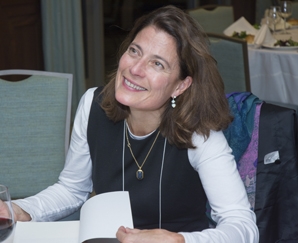Department of History and Political Science hosts interdisciplinary conference about WWI

In 2000, William Walker, Ph.D., former vice president for academic affairs, dean of the faculty and professor of history at Chestnut Hill College, came up with the idea for CHC to host a series of interdisciplinary conferences focused on historical events.
Recently, he recalled that the rationale for the series was to expose Chestnut Hill College students and faculty to a broad range of national and international scholars who were pursuing active research projects. Also, he wanted to enhance the academic reputation of the College as a vibrant and exciting center of learning. With the support of President Carol Jean Vale, SSJ, Ph.D., the idea was transformed into a reality.
The Legacy Conference series was launched in 2003 with an intensive, two-day look at the Kennedy years. The Kennedy Legacy was followed by the Legacy of the Second World War in 2005; The Legacy of 1968 in 2008; and the Legacy of the Civil War in 2011.
Now, on the 100th anniversary of WWI, the Legacy of WWI conference was held November 14 and 15 and drew 111 audience members and 55 participants — a record for this series — to campus.
Explaining the conference theme's broad appeal, Lorraine Coons, Ph.D., professor of history and chair of the history and political science department, describes World War I as "a profound pivotal event that militarily, politically, technologically, socially, culturally, and intellectually has cast a long shadow and affected today's mentalité more than any other of the modern world."

"These conferences have been very successful in the tri-state area," she says. "We made a choice to continue them after Bill retired. We're proud of what we've been able to do for such a small school. We had presenters from eight countries and 15 states this year, as well as several faculty members, our best yet," she added.
The first conference keynote speaker was Robert Dallek, a pre-eminent historian and Kennedy scholar. Coons is still surprised that they were able to sign him that year. He set the stage for the conferences to follow; all keynote speakers are tops in their respective fields.
"We have been very fortunate to get each one of them," says Coons. "Our unique college atmosphere and the interdisciplinary nature of our conference is special." And the foresight and planning no doubt plays a role in lining up top-notch speakers for each conference – planning that starts almost as soon as the last conference ends.
This year's keynote speakers were no exception. Jay Winter, Ph.D., the Charles J. Stille Professor of History at Yale University, and a specialist on WWI and its impact on the 20th century spoke on Friday. He has written or co-authored more than a dozen books on topics related to the subject and he was the chief historian, co-writer and co-producer for the PBS series, "The Great War and the Shaping of the 20th Century," which won several awards for best television documentary in 1997, including an Emmy, a Peabody and a Producers Guild of America award.
Winter's presentation was titled "The Great War 100 Years On: A Trans-National Perspective." In an interview prior to the conference, Winter said that war is a Pandora's Box with destructive forces that cannot be controlled once opened.
"Sometimes war is necessary, such as against Hitler in 1939, but it never follows the path that the people who launch it hope it will follow," said Dr. Winter.
"Ten million men were killed and 25 million were wounded in four years (during WWI). Here was a war which eroded and then erased the distinction between military and civilian targets, leading to atrocities, war crimes and the first genocide of the 20th century. No one can make sense of our violent times without returning to the primal catastrophe of the 20th century – the First World War."
Saturday's speaker was Laura Lee Downs, Ph.D., chair in gender history in the Department of History and Civilization at the European University Institute in Florence, Italy.
Downs is a noted researcher and author on topics surrounding social welfare issues and, in particular, the relationship between the social and the political in 20th-century Europe as well as in France, Italy and Great Britain from about 1870 to 1970. Her presentation was titled, "Women, Work, and the Transformation of State/Society Relations During the First World War: Some Long-Term Legacies for European Society and Politics."
In her presentation, Downs delved into the war's effect on society, and "what constituted [war] work, and what was not work," most specifically for women. World War I opened the door for the female work force.
"Wives and daughters, whether previously employed or not, moved into full-time employment in war-related industries and services," Downs said. "In a time of war, this meant exhausting stretches of shift work often 10 to 12 hours or more, 13 days on end; one day off every two weeks."
This work was hard, and in almost all cases did not pay as much as what a man would make doing the same job. Downs presented this information so eloquently and with such enthusiasm that anyone in the room could tell she has a passion for her field of expertise and loves sharing it with those who will listen.
As part of the two-day event, papers were presented by 55 scholars and books by each keynote speaker were available for purchase.



